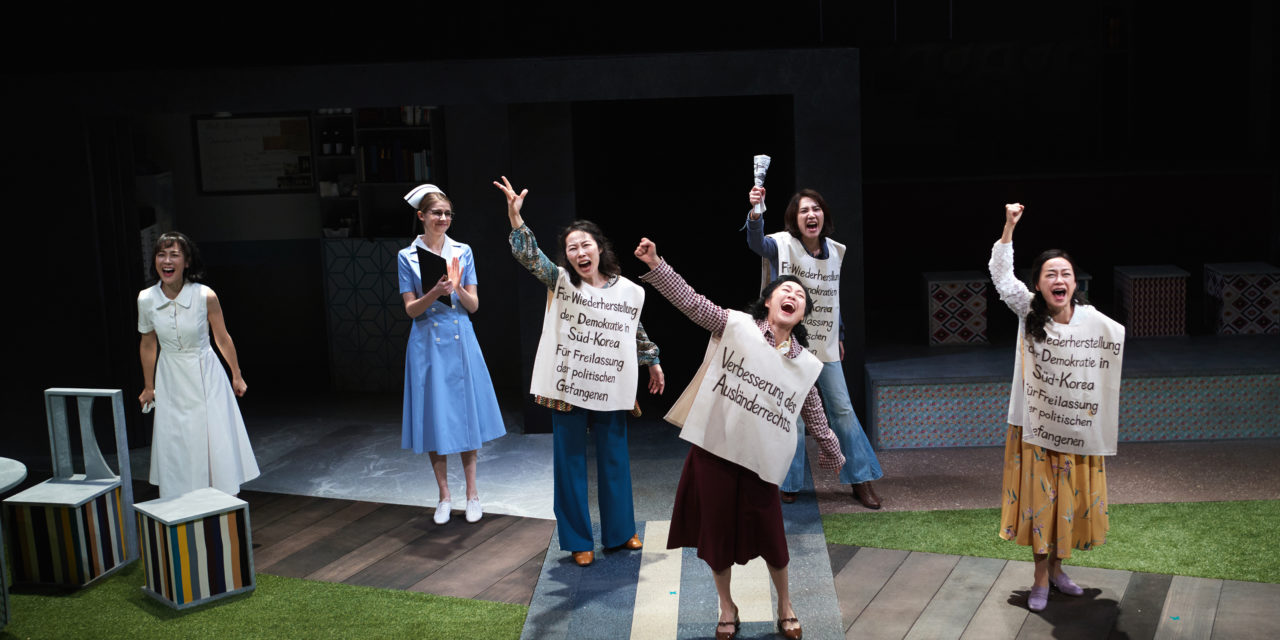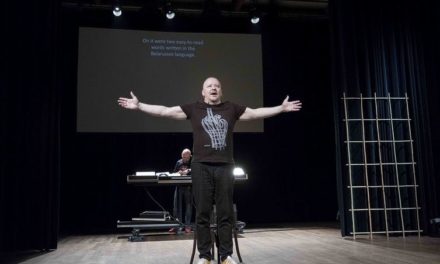This is Part 2 of a two-part article. Read Part 1 here.
From Caregiver to Citizen
The Nurses, Who Do Not Return Home, written and directed by Kim Jae-yeop, also depicts Korean migrants who no longer see South Korea as their home country. The play is also based on the memories of actual immigrants; Kim interviewed a group of Korean-German women during a year-long stay in Berlin. But while A Room deals almost entirely with painful memories, The Nurses, which premiered at Seoul Arts Center’s Jayu Theater, focuses on the happy and liberating experiences of several Korean women in West Germany, tracing how they became political activists and “world citizens,” as Kim describes.
Most of these women were nurses who went to Germany in the 60s and 70s through a program run by the Korea Overseas Development Corporation. South Korea exported these medical workers—roughly ten thousand in all—to help bring in foreign currency needed to drive economic growth. As an early scene in the play depicts, these women were framed as patriots, wearing traditional hanbok and waving the South Korean flag to fanfare and applause as they boarded planes bound for Germany. Some of them stayed after their three-year contracts, shedding the image of self-sacrificing Korean daughters to take charge of their own lives.
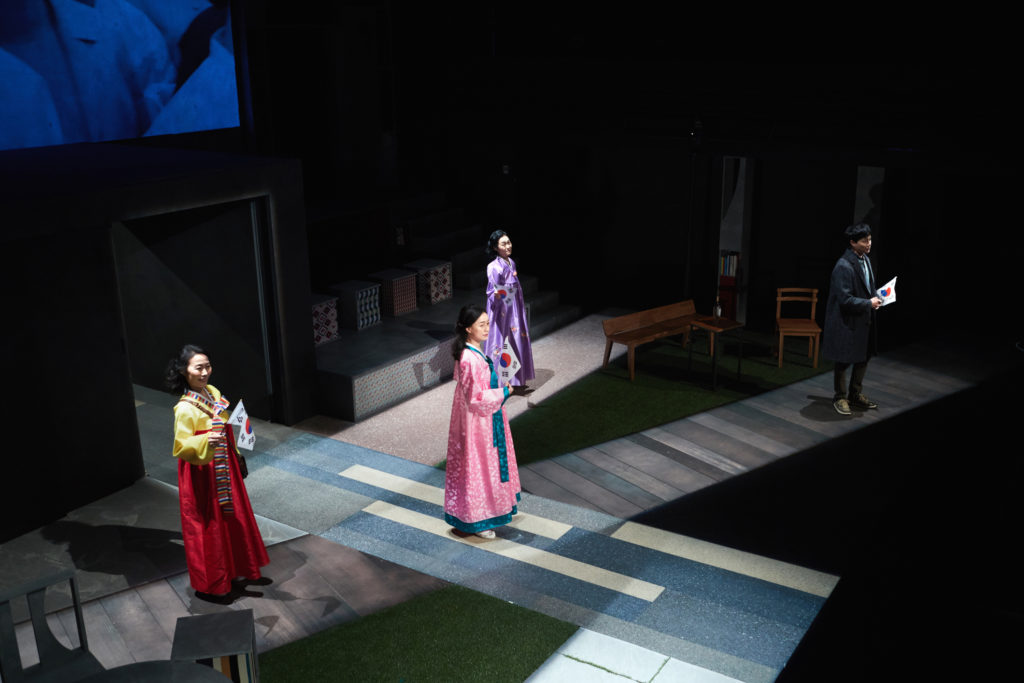
The Nurses, Who Do Not Return Home, written and directed by Kim Jae-yeop. Photo Courtesy of Seoul Arts Center.
The play follows the lives of four friends from youth to old age: three nurses, Myeong-ja (Jeon Cook-hyang), Soon-ok (Lee Young-sook), Cook-hee (Hong Seong-Kyeong), and Jung-min (Kim Won-Jung), a Ph.D. student and, later, scholar in political science. While all of the main characters have real-life counterparts, Jung-min is notably based on the late Dr. Yoo Jeong Suk, who pioneered research on Korean immigrants in Germany. These four women take center stage as political history unfolds around them.
Remarkably, the play teaches us that the nurses themselves secured the legal right to live and work in Germany indefinitely. In one scene, they organize a protest campaign against the government’s immigration policies, which hardened up after the 1973 oil crisis. They also form the Korean Women Association in Germany to support one another and respond as a unified group to political issues. Early in the play, the timid nurses were too terrified to even answer the phone in German. But by the time they decide to settle in Germany, we see them aid other immigrant communities and refugees, as well as hold rallies against political oppression in and beyond South Korea.
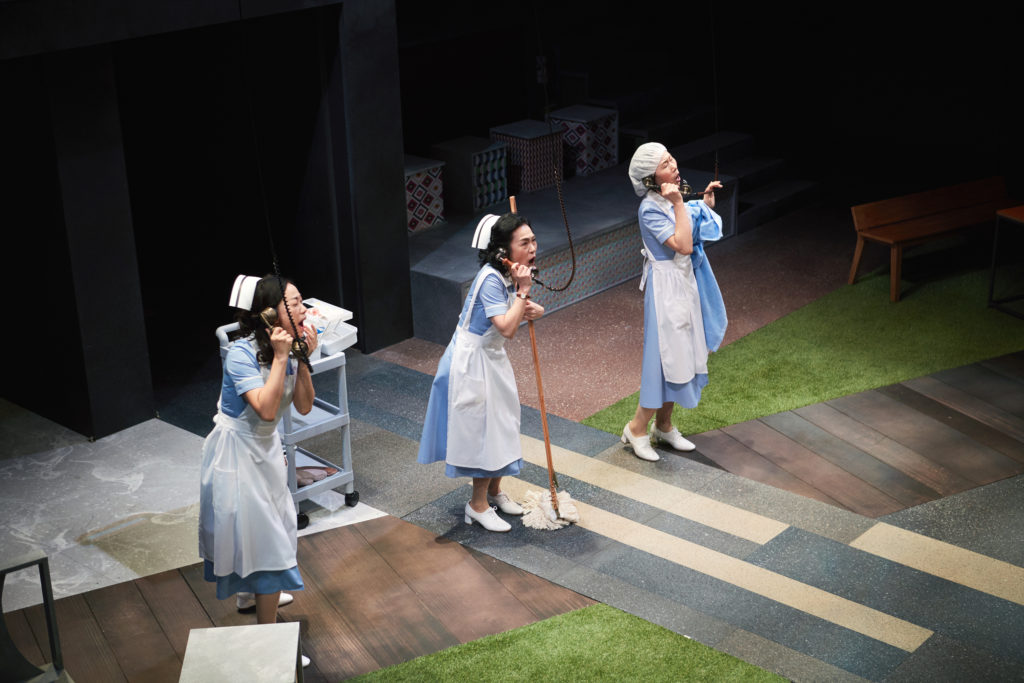
The Nurses, Who Do Not Return Home, written and directed by Kim Jae-yeop. Photo Courtesy of Seoul Arts Center.
Later, the main characters see shocking news footage of the Gwangju Uprising on German television. In 1980, Korean military units fired into a large crowd demonstrating against dictator Chun Doo-hwan, killing hundreds of civilians. But when the women call their families to find out what is going on, they discover that the rest of South Korea is oblivious to this horrific incident, as the government censored any mention of the uprising and its suppression in Korean media. Enraged, they decide to smuggle tapes of German news reports to Korea to inform their compatriots.
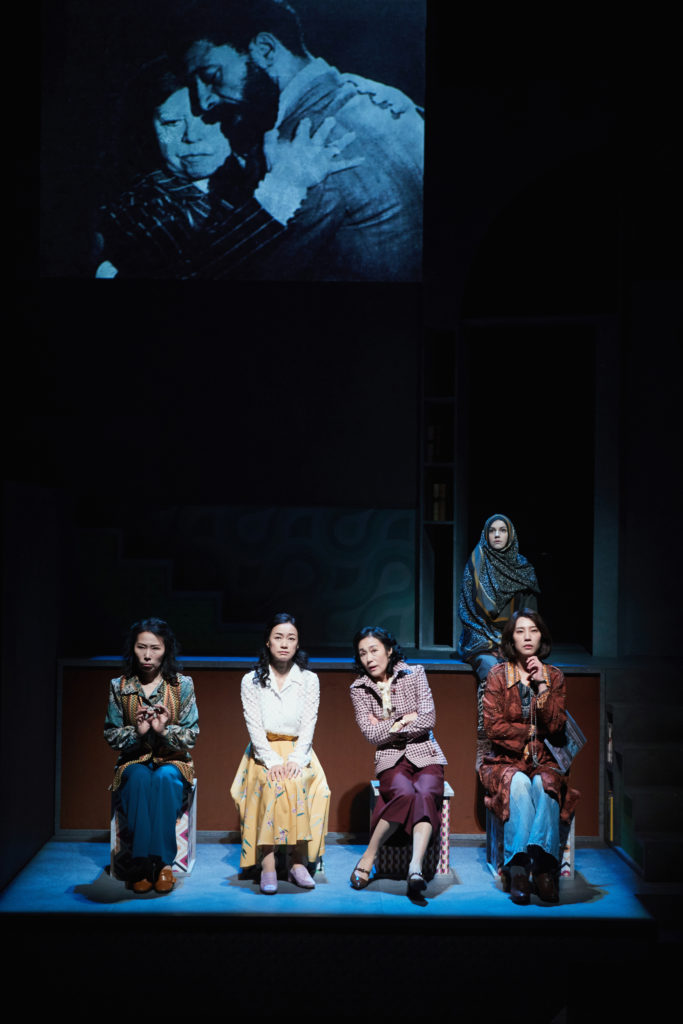
The Nurses, Who Do Not Return Home, written and directed by Kim Jae-yeop. Photo Courtesy of Seoul Arts Center.
Alongside their political activism, The Nurses also highlights changes in these women’s personal lives, which, of course, is no less political. In one of the play’s most beautiful scenes, the four are in a movie theatre watching Fassbinder’s 1974 film Ali: Fear Eats The Soul (incidentally, also about a migrant worker). We observe their faces tremble with anguish and pity, see their worldviews expand. In Germany, the nurses learn how to live for their own sake, not the good of the nation or their families back in Korea. Over time, a Beethoven record or a drink at a bar becomes their prerogative as working women rather than a guilty luxury. Without having to get permission from their parents, they marry and start families in Germany: another sure sign that they intend to stay. They are free to fall in love and fall in love with freedom along the way.
Overall, the characters lead happy lives, rooted in the fond memories of Kim’s interviewees. But why create a theatre piece about people doing well? The Nurses often feels uneventful despite the string of victories, both small and large, that the women achieve. I watched the pleasant vignettes impatiently, wondering when the happiness would shatter. I waited for scenes of unjust discrimination and homesickness, pain and suffering—familiar elements in a story about immigrants.
But these women do not stay up at night pining for their homeland. They don’t feel the urge to reconnect with their roots. They don’t even complain much about German food. The fact that these nurses thrive in Germany undermines a fundamental assumption about Korean immigrants around the world: that they really belong in Korea. Kim is aware that his docudrama challenges extant narratives about the migrant experience when he notes in the program: “Our collective memory of patriots working abroad to earn foreign currency and contribute to South Korea’s modernization cannot fully account for the individual lives of these migrant women.” In that regard, The Nurses replaces a national myth with actual testimonies.
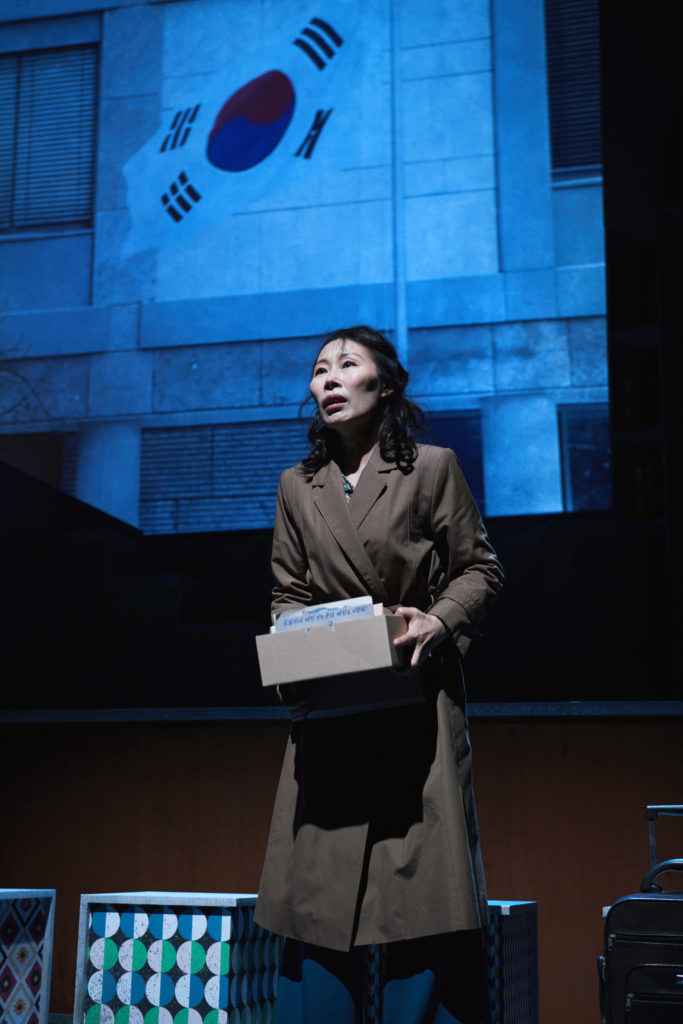
The Nurses, Who Do Not Return Home, written and directed by Kim Jae-yeop. Photo Courtesy of Seoul Arts Center.
Moreover, the play criticizes South Korea for failing to be a desirable home, especially to those whose political beliefs do not line up perfectly with the state’s. When Cook-hee visits Korea, a government investigator harasses her because of her family’s Socialist background before the Korean War. The principle of guilt-by-association hounds Cook-hee even after she returns to Berlin. Mysterious pamphlets containing North Korean propaganda arrive at her doorstep, which, it turns out, were planted by South Korean spies trying to frame her as a Communist sympathizer. The other women work together to protect Cook-hee, but she stops coming to the Women Association meetings when the pressure becomes too much to handle. In any event, she is never going back to Korea.
New Migrant Narratives
If economic opportunity was the main context for migrant narratives in the past, both A Room and The Nurses emphasize politics, especially Cold War politics, as the factor that determines these migrant characters’ relationships with South Korea, their “natural” homeland. This political dimension also calls attention to other Koreans who live beyond South Korea’s borders—namely, our dongpo in the North. The only North Korean character to appear in either play is Peter Hyun’s hallucination of his sister Alice, who defected after the Korean War. But the mounting ideological pressure raises a troubling question: If a Korean stops being South Korean, does that mean they could become North Korean? The government’s answer to this question had a profound impact on the lives of immigrants who traveled back and forth.
Both plays also explore themes of memory and aging because the first-generation immigrant population has grown old. Emigration rates to developed countries such as the U.S. and Germany fell sharply after the 90s, as South Korea’s economy became globally competitive. But even today, the country struggles with the legacy of Cold War persecution that pushed away people like Peter Hyun and Cook-hee, people whose biographies cannot be subsumed under a national narrative. These plays remind us that South Korean politics has not progressed as much as its economy. A Room and The Nurses accounts for this neglected political perspective, with the hope that these shunned migrants may feel welcome in Korea once again.
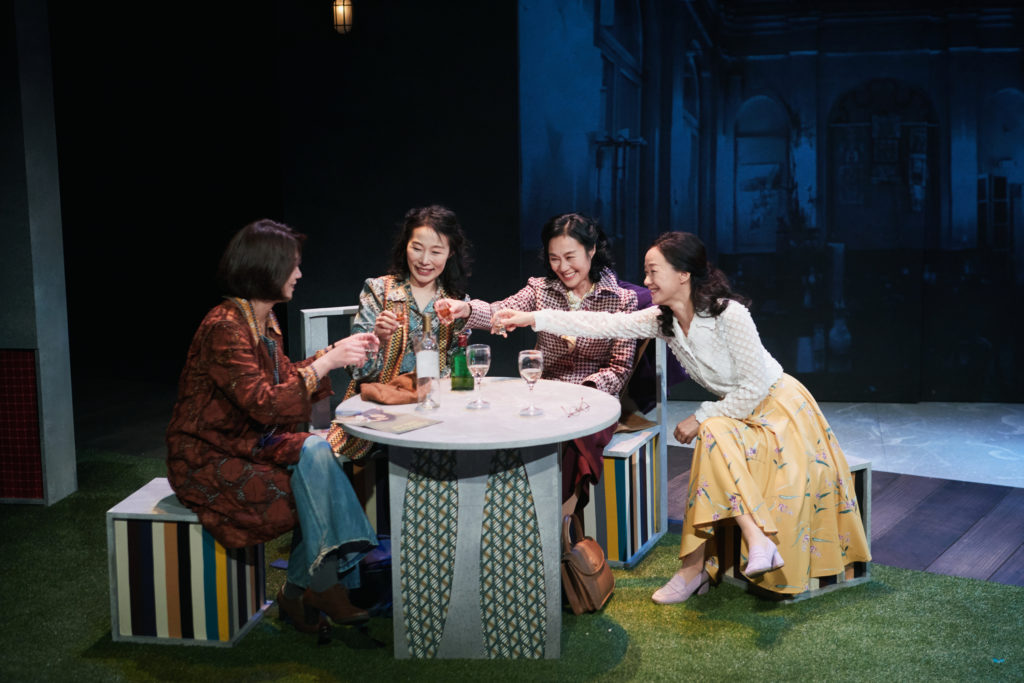
The Nurses, Who Do Not Return Home, written and directed by Kim Jae-yeop. Photo Courtesy of Seoul Arts Center.
This post was written by the author in their personal capacity.The opinions expressed in this article are the author’s own and do not reflect the view of The Theatre Times, their staff or collaborators.
This post was written by Kee-Yoon Nahm.
The views expressed here belong to the author and do not necessarily reflect our views and opinions.

